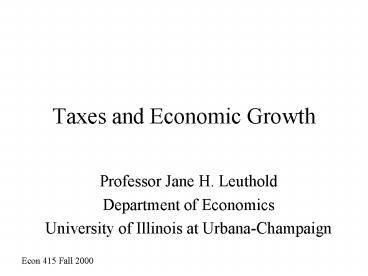Taxes and Economic Growth - PowerPoint PPT Presentation
1 / 24
Title:
Taxes and Economic Growth
Description:
The safe asset yields no return and bears no risk. ... O. P. A. OA/OP = share of the portfolio in the risky asset ... GROWTH = b0 b1 TI/T b2 INF b3 YP b4 X e ... – PowerPoint PPT presentation
Number of Views:88
Avg rating:3.0/5.0
Title: Taxes and Economic Growth
1
Taxes and Economic Growth
- Professor Jane H. Leuthold
- Department of Economics
- University of Illinois at Urbana-Champaign
Econ 415 Fall 2000
2
Topics for today
- Economic growth as a policy goal
- Effects of taxation on saving and risk-taking
- Tax incentives for growth
- Empirical tests of the effect of taxation on
growth
3
Benefits of economic growth
- Leads to increases in standards of living for
future generations - Seen as a way of reducing poverty for future
generations - Growth may be a merit good, a good that is
meritorious in its own right
4
Costs of economic growth
- Growth may require the use of regressive and
unfair taxes. - Growth may require distorting taxes that create
excess burdens. - Special provisions in the tax system to favor
particular activities make the tax system more
difficult to administer and collect. - Growth may have a negative effect on the
environment or on the supply of natural
resources, placing a burden on future
generations.
5
Tax on interest income
Interest rate
SD
D
SD
r1
re
Investor
Saver
r2
Ie
Ie
Savings, investment
6
Saving No Tax Case
7
Saving Interest Tax
8
Substitution and Income Effects
Substitution effect A
C
Income effect C
B
Total effect A
B
9
Other motives for saving
- Precautionary motive -- saving takes place mainly
to cushion risks - Bequest motive -- saving is mainly so as to leave
a bequest to heirs
10
Bequest motive
Future consumption
What is the excess burden caused by this tax?
I0
I1
I2
Desiredbequest
CP
CP
Present consumption
11
Empirical evidence
Typical savings model ln St a0 a1 Ydt a2
rt a3 Wt et Leuthold - Mkwezalamba
Model St a0 a1 it (1-?t) a2 ?t a3
YPCt (1-?t) a4 GSt a5 FSt ?t St b0
b1 it b2 ?t b3 Yt b4 GSt b5 FSt
b6 ?t ?t
12
Open economy saving
Interest rate
SD
D
SD
Worldinterestrate
Borrowing
I1
S2
S1
Savings, investment
13
Taxes and risk-taking
- Interest income taxes reduce the reward for
risk-taking by taxing its return, thus
discouraging risk-taking. - Taxes that allow a loss-offset make the
government a partner in the risk, thus
encouraging risk. - The net effect of taxes on risk-taking depends on
these two offsetting effects.
14
Risk-taking
15
Assumptions
- The investor has a fixed portfolio to allocate
between a safe and a risky asset. - The safe asset yields no return and bears no
risk. - The risky asset yields a positive return and
bears a positive risk.
16
Risk-taking
17
Risk-taking with a full loss-offset
18
Loss-offset
- A loss-offset allows a taxpayer to subtract
losses from gains in computing tax liability. - A loss-offset may not be perfect (or full)
because - Taxpayers may not have sufficient income against
which to offset losses despite carry-backs and
carry-forwards. - Progressive taxes tax gains at high tax rates and
offset losses at low tax rates.
19
Other tax incentives for growth
- Investment tax credits and accelerated
depreciation - Tax incentives for exports -- export promotion
schemes tax rebates for exports income tax
exemption on export earnings - Tax incentives for "key" industries -- tax
holidays, targeted investment credits, tariffs
for effective protection
20
Would switching to a consumption (or wage) tax
increase growth?
- A consumption tax favors saving relative to an
equal yield income tax. - An income tax favors work relative to an equal
yield consumption tax. - Switching from an income tax to an equal yield
consumption tax would have an indeterminate
effect on saving.
21
Saving and work
S TC
Interest rate
Wage rate
S TY
D
S
Labor
Ie
S, I
Ie
HC HY H
22
Empirical evidence
Mañas-Antón Model GROWTH a0 a1 TI/T a2
DPOP a3 AGE a4 XGW a5 INF a6 YPC
e GROWTH Growth of real GDP TI/T Income tax
DPOP Population growth AGE Share of
population 15-65 years XGW Growth of share of
exports in GDP INF Change in domestic price
index YPC Per capita GNP (or GDP)
23
Lab 13 Taxes and growth
Use data from WDI to estimate the following model
GROWTH b0 b1 TI/T b2 INF b3 YP b4 X
e
where X is any control variable of your choice.
24
Next time
Thursday Lab 13 Tax Ratios and Growth No
Chat this week!































